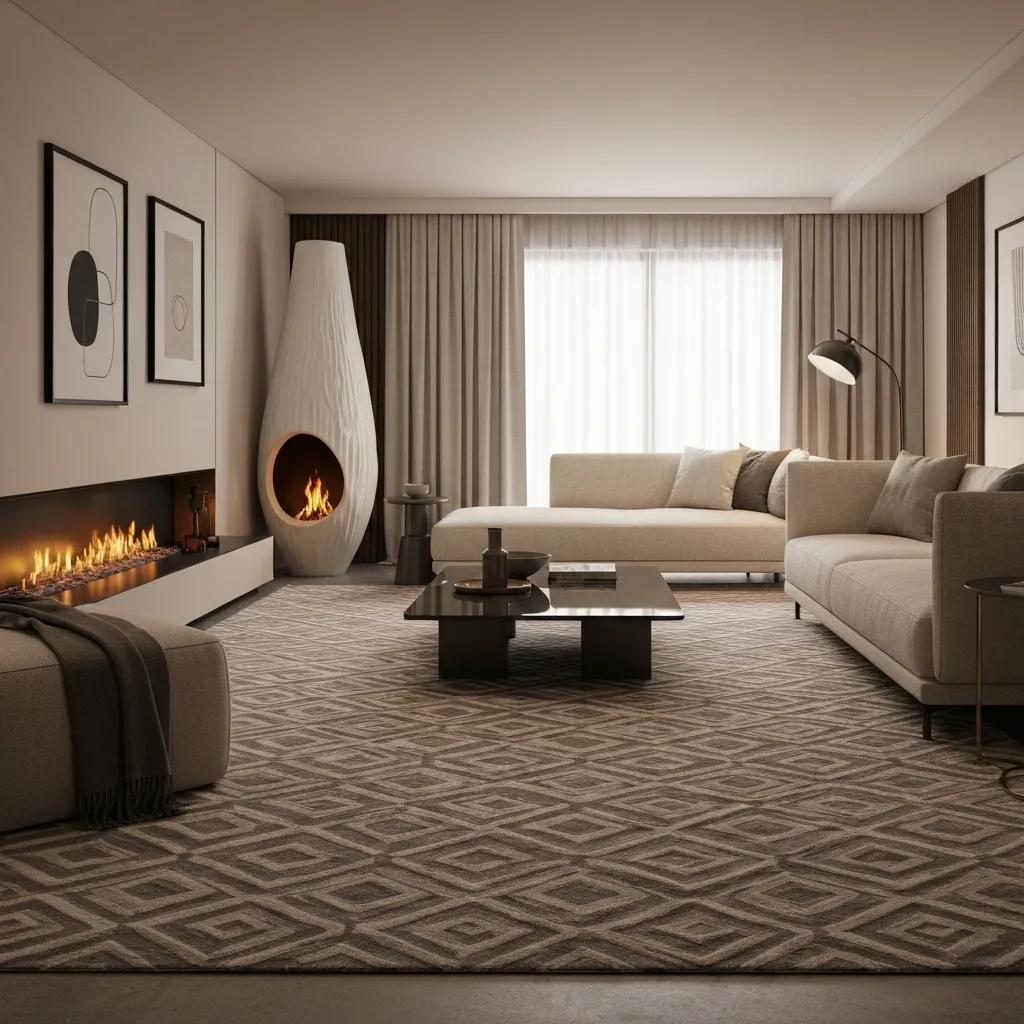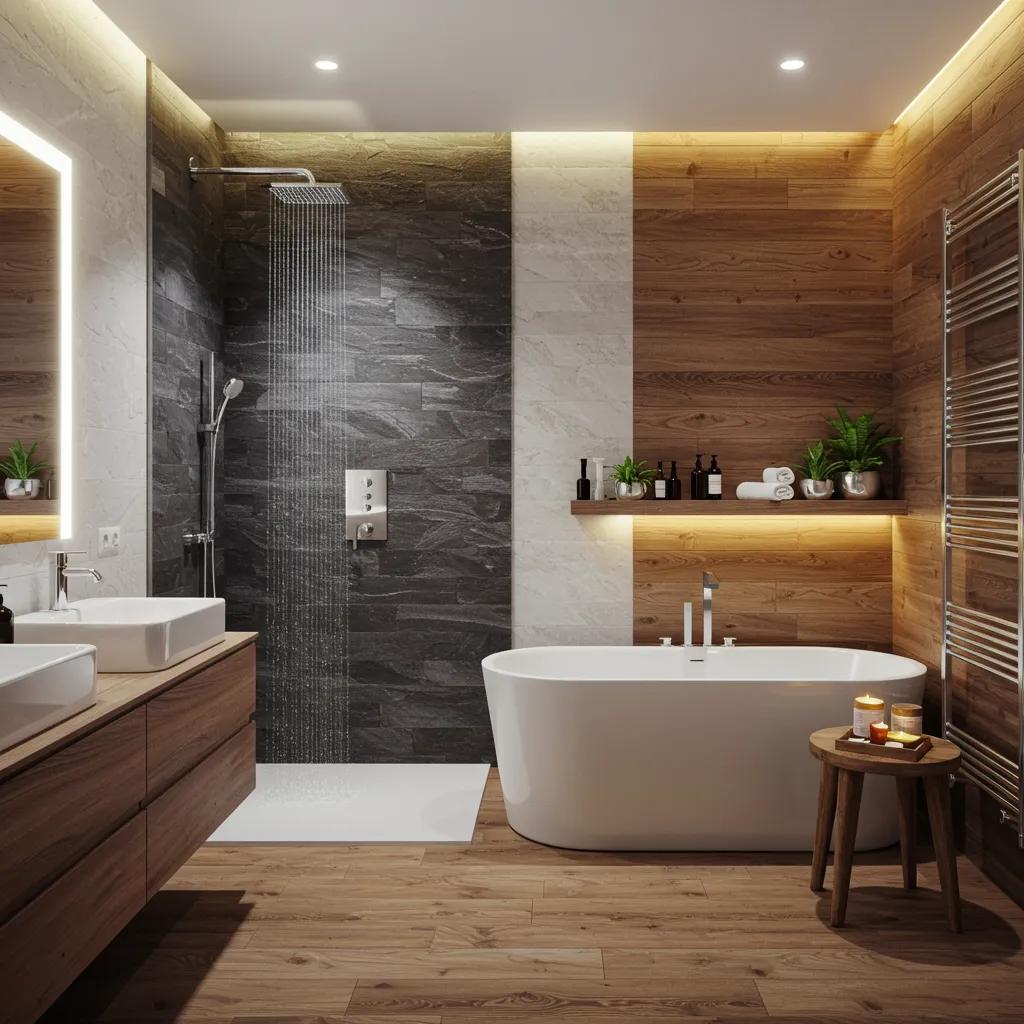Choosing between hardwood vs. engineered wood flooring is a significant decision that impacts not only the aesthetic of your home but also your budget, maintenance routine, and long-term satisfaction. While solid hardwood offers timeless appeal and the ability to be refinished multiple times, engineered wood provides greater versatility for installation over various subfloors and enhanced resistance to moisture and temperature fluctuations. In this guide, we’ll compare the key characteristics of each—from composition and cost to durability and design options—so you can confidently select the flooring that best fits your lifestyle, your home’s environment, and your vision.
Hardwood vs. Engineered Wood Flooring: What Homeowners Must Know
What Sets Hardwood and Engineered Wood Flooring Apart?

When planning a flooring upgrade, one of the biggest decisions you’ll face is choosing between hardwood vs. engineered wood flooring. While both options feature genuine wood and add warmth, beauty, and value to a home, they differ significantly in construction, durability, maintenance needs, and long-term performance. Understanding these differences will help you choose the right material for your space and lifestyle.
Solid hardwood flooring is made from a single piece of wood cut directly from the tree. It is prized for its durability, timeless appeal, and the ability to be sanded and refinished many times throughout its lifespan. This makes it a long-term investment that can last for generations if properly maintained. Engineered wood flooring, by contrast, is constructed with a real wood veneer on top of a high-density plywood or fiberboard core. This layered design enhances dimensional stability, meaning it is less prone to expansion and contraction when humidity levels change.
The result is that solid hardwood offers unmatched longevity and the potential for multiple refinishes, while engineered wood delivers excellent moisture resistance and versatility, especially in areas where traditional hardwood may not perform as well.
Durability and Longevity: How Do They Compare?
Durability is one of the most important factors when deciding between hardwood vs. engineered wood flooring. Solid hardwood is known for its impressive strength and can easily last 50 years or more with proper care. Because it is made from a single piece of wood, it can be sanded and refinished several times over its lifespan, allowing homeowners to refresh its appearance or repair surface damage without replacing the floor.
Engineered wood, while still highly durable, typically lasts between 20 and 40 years. It can often be refinished once or twice, depending on the thickness of its top veneer layer. However, its stability makes it less likely to warp or cup in environments with fluctuating humidity, which helps preserve its appearance and structural integrity over time. This makes engineered wood a strong contender for spaces like basements, kitchens, and bathrooms where moisture might be a concern.
Moisture Resistance and Climate Performance
One of the biggest advantages of engineered wood flooring is its resistance to moisture-related issues. Its multi-layered construction allows it to expand and contract less dramatically than solid hardwood, reducing the risk of warping, buckling, or gapping. This makes it a better choice for regions with high humidity or homes that experience significant seasonal changes.
Solid hardwood, while durable, is more sensitive to environmental conditions. It can swell in humid climates and shrink in drier air, which may lead to gaps or surface changes over time. For this reason, solid hardwood is typically best suited for above-grade, climate-controlled areas, while engineered wood offers more flexibility across different environments.
Style, Value, and Maintenance Considerations
Both types of flooring deliver the natural beauty and elegance that wood is known for, and both can significantly boost a home’s resale value. Solid hardwood often appeals to buyers because of its longevity and ability to be refinished repeatedly, which allows homeowners to change stain colors or refresh the surface over decades. Engineered wood offers a wider range of installation options, including over concrete slabs or radiant heating systems, which expands its versatility in modern home design.
Maintenance requirements are fairly similar for both options. Regular sweeping or vacuuming, prompt cleanup of spills, and occasional refinishing (for solid hardwood) will keep floors looking their best. Engineered wood requires less intensive maintenance over its lifespan due to its moisture-resistant structure, but it offers fewer opportunities for refinishing.
Choosing the Right Flooring for Your Space
The decision between hardwood vs. engineered wood flooring ultimately depends on your priorities, environment, and budget. If you want a timeless floor that can last for generations and be refreshed multiple times, solid hardwood is hard to beat. If you need a floor that handles moisture well, offers flexible installation options, and still provides the beauty of real wood, engineered flooring may be the smarter choice.
Both options offer distinct advantages, and with proper care, either can provide decades of warmth, character, and durability for your home.
How Do Hardwood and Engineered Wood Flooring Costs Compare in Atlanta?

When weighing hardwood vs. engineered wood flooring, cost is one of the biggest factors Atlanta homeowners consider. Both materials add beauty and value to a property, but they differ significantly in price, installation methods, and long-term return on investment. Understanding these cost differences can help you choose the right option for your home and budget.
Solid hardwood flooring generally comes with a higher upfront price because it is crafted from a single piece of wood. In Atlanta, the material itself typically ranges from $8 to $15 per square foot, with installation adding another $3 to $5 per square foot for traditional nail-down methods. This means a full installation can cost between $11 and $20 per square foot depending on the wood species, grade, and complexity of the project.
Engineered wood flooring is usually more affordable, ranging from $4 to $10 per square foot for the product, with installation costs of about $2 to $4 per square foot. Its layered construction and easier installation methods, such as glue-down or floating floors, help keep total costs lower. Homeowners can expect to pay between $6 and $14 per square foot for a professionally installed engineered wood floor in most Atlanta homes.
Long-Term Costs and Refinishing Considerations
Initial costs tell only part of the story when deciding between hardwood vs. engineered wood flooring. Over time, refinishing and maintenance also affect overall expenses. Solid hardwood can be refinished multiple times throughout its lifespan, typically costing $2 to $4 per square foot per session. This ability to refresh the floor’s surface means it can last for decades, often over 50 years, without needing full replacement.
Engineered wood can also be refinished, but only once or twice in most cases because of its thinner veneer layer. Refinishing costs are slightly lower, averaging $1 to $2 per square foot. While its overall lifespan is shorter, usually around 20 to 40 years, the reduced maintenance needs and lower installation costs can make engineered wood a more budget-friendly choice in the short to medium term.
Installation Methods and Their Impact on Cost
The way your flooring is installed also influences your total project cost. Solid hardwood floors typically require nail-down installation, which is more labor-intensive and can add time and expense. However, this traditional method provides a highly durable and long-lasting bond with the subfloor, which contributes to the floor’s overall longevity and resale value.
Engineered wood, on the other hand, offers more flexible installation options. Glue-down, click-lock floating, and even staple-down methods are available, many of which require less labor and time. This flexibility makes engineered wood appealing for homeowners looking to keep project costs under control without sacrificing the look and feel of real wood.
Value and Return on Investment
Both types of wood flooring can increase your home’s resale value, but solid hardwood typically offers a greater return because of its longevity and timeless appeal. Buyers often view it as a premium feature, and its ability to be refinished multiple times makes it an investment that can evolve with changing interior styles. Engineered wood still boosts property value, though usually to a slightly lesser extent, due to its shorter lifespan and limited refinishing potential.
Choosing the Right Flooring for Your Budget
Ultimately, the decision between hardwood vs. engineered wood flooring depends on your priorities. If you plan to stay in your home long-term and want a floor that can last for generations, solid hardwood may be worth the higher initial investment. If you’re looking for a cost-effective solution with easier installation and strong moisture resistance, engineered wood offers excellent value. By weighing upfront costs, installation methods, and long-term maintenance, you can make a well-informed choice that fits both your budget and your home’s needs.
What Installation Methods Are Used for Hardwood and Engineered Wood Flooring?

When deciding between hardwood vs. engineered wood flooring, understanding how each type is installed is an important part of planning your project. The installation method not only affects the cost and time involved but also determines where each type of flooring can be used and how well it will perform over time.
Solid hardwood flooring is traditionally installed using the nail-down method. In this process, ¾-inch planks are secured directly to a wooden subfloor with specialized nails or staples, creating a durable and stable surface. This technique requires a proper hardwood-grade subfloor and is most commonly used in above-grade spaces where moisture levels are controlled. The result is a long-lasting floor that can be refinished multiple times, making it ideal for living rooms, bedrooms, and other interior spaces where stability and longevity are top priorities.
Engineered wood flooring, on the other hand, offers more flexibility when it comes to installation, which is one reason it has become a popular choice for modern homes. One of the most common methods is the glue-down installation, where the planks are adhered directly to a concrete slab or subfloor using a strong, moisture-resistant adhesive. This approach works particularly well in basements or on-grade concrete floors where nailing is not an option. It also helps reduce sound transmission and creates a secure bond between the flooring and the subfloor.
Another option for engineered wood is the floating, or click-lock, installation system. In this method, the boards are designed to snap together and rest on top of an underlayment without being attached to the subfloor with nails or glue. This makes the installation process faster and more cost-effective and allows for easy removal or replacement in the future. Because floating floors are less affected by temperature and humidity changes, they are a practical choice for areas with fluctuating conditions, such as sunrooms or finished basements.
While solid hardwood is limited to nail-down installation due to its single-plank construction, engineered wood’s layered design allows it to accommodate different installation techniques and subfloor types. This flexibility also means engineered wood can often be installed in spaces where traditional hardwood cannot, such as directly over concrete or radiant heating systems.
The choice of installation method also influences how the flooring will perform over time. Nail-down hardwood installations are extremely stable and can last for decades with proper care, while glue-down engineered floors offer excellent resistance to moisture and movement. Floating engineered floors are the easiest to install and replace, but they may have slightly more movement underfoot compared to nailed or glued options.
Which Flooring Type Is Best Suited For Atlanta’s Climate And Home Environments?

Choosing between hardwood vs. engineered wood flooring in Atlanta comes down to how each product handles humidity and temperature swings. Summers are muggy, winters can be dry, and those shifts affect how wood behaves. Understanding where each option excels will help you place the right material in the right room and avoid movement, gaps, or cupping over time.
Engineered Wood: Best For Variable Conditions
Engineered wood is built with a real wood veneer over a stable core, which helps it resist expansion and contraction as indoor humidity changes. That stability makes it a strong fit for basements, kitchens, laundry rooms, and spaces that receive a lot of sun. It also pairs well with radiant heat because the layered construction tolerates gentle temperature changes. If you want the look of oak, hickory, or maple in rooms that see more moisture or fluctuating conditions, engineered wood offers the flexibility to install over concrete slabs or existing floors without sacrificing the appearance of natural hardwood.
Solid Hardwood: Best For Stable, Climate-Controlled Rooms
Solid hardwood shines in living rooms, dining rooms, and bedrooms where indoor conditions stay relatively consistent. Because each plank is a single piece of wood, it can move more with seasonal humidity, so above-grade, climate-controlled spaces are ideal. The big advantage is longevity. Solid floors can be sanded and refinished many times, which lets you refresh wear, adjust stain color, and keep the same floor looking new for decades. In historic or formal rooms, that refinishability and classic character often tip the scales toward solid hardwood.
How To Match Flooring To Your Space And Lifestyle
Start with location. Below-grade areas and rooms that see frequent spills or steam benefit from engineered wood. Main living spaces that stay dry and conditioned reward the investment in solid hardwood. Next, think about traffic and durability. Harder species and thicker wear layers stand up better in hallways and entry zones, whether you choose engineered or solid. Finally, consider comfort systems and subfloors. If you have concrete or radiant heat, engineered wood’s installation options make life easier while maintaining a seamless look from room to room.
Maintenance, Value, And Day-To-Day Living
Both options are simple to care for with routine sweeping and prompt cleanup of spills. Solid hardwood offers long-term value through repeated refinishing, which can extend its life well beyond a few decades. Engineered wood delivers value through installation flexibility and improved stability, reducing the risk of seasonal movement and keeping joints tight. Either choice can lift resale value, but buyers often view solid hardwood as the premium upgrade in traditional, climate-controlled spaces.
The Bottom Line For Atlanta Homes
Atlanta’s humidity favors engineered wood in moisture-prone or variable rooms, while solid hardwood excels where temperatures and humidity stay steady. By placing each product where it performs best, you get the beauty of real wood throughout the home with fewer worries about seasonal changes. Match the material to the environment, and your floors will stay quiet, stable, and good-looking for years to come.
How Can Restor-It Help You Choose and Install the Right Wood Flooring?

Choosing between hardwood vs. engineered wood flooring can feel overwhelming, especially when factoring in durability, aesthetics, and long-term performance. Working with an experienced flooring company can make the decision easier by ensuring the right product is selected for your home’s unique conditions and that installation is done properly for maximum longevity.
Expert Guidance Based on Your Home’s Needs
A professional team begins with an in-depth evaluation of your space, considering subfloor condition, room usage, and your overall design goals. Rooms with heavy foot traffic might benefit from harder wood species or engineered options with durable wear layers, while formal living areas could call for the timeless look and refinishable quality of solid hardwood. Understanding where moisture might be present, how sunlight affects your rooms, and what kind of maintenance you’re comfortable with are all key parts of the selection process.
Detailed Planning and Transparent Cost Estimates
A thorough consultation should include clear pricing and detailed estimates, outlining both material and labor costs. Factors like square footage, installation type, and preparation needs can all influence the total investment. Having these details upfront helps you compare the long-term value of hardwood vs. engineered wood flooring and choose the best fit for your budget and lifestyle.
Precision Installation for Lasting Performance
Proper installation plays a major role in how your floors look and perform over time. Nail-down installation is typically used for solid hardwood and requires a stable subfloor to secure the planks tightly. Engineered wood, on the other hand, offers more flexibility with glue-down or floating systems, which can be ideal for basements, concrete slabs, or rooms with radiant heat. Experienced installers ensure every board is properly fitted and leveled, preventing future issues like gaps, warping, or uneven wear.
Long-Term Care and Maintenance Support
Once your new flooring is in place, maintenance practices will help extend its lifespan. Solid hardwood can be sanded and refinished multiple times, restoring its original appearance even after decades of use. Engineered wood may not allow for as many refinishings, but regular cleaning and occasional recoating can still keep it looking its best. Professional support with refinishing, subfloor repairs, or maintenance advice ensures your investment continues to perform well year after year.
Choosing The Best Flooring For Your Atlanta Home
Both hardwood and engineered wood flooring bring value, style, and durability to Atlanta homes, but they shine in different ways. Solid hardwood excels in stable, climate-controlled areas and offers unmatched longevity, while engineered wood provides superior moisture resistance and versatility in installation. By considering your home’s conditions, design preferences, and long-term goals, you can confidently choose the flooring type that will elevate your space for decades.
With expert assessment, precise installation, and ongoing care, homeowners can enjoy the beauty and performance of wood flooring that’s tailored to their space and built to last. Whether you’re drawn to the classic charm of solid hardwood or the modern versatility of engineered wood, aligning your choice with your home’s unique needs will ensure a result that’s both functional and beautiful.
Conclusion
Choosing between hardwood and engineered wood flooring ultimately depends on your home’s environment, lifestyle, and long-term goals—but both options offer timeless beauty and lasting value when installed correctly. At Restor-It, Inc., our flooring specialists help you navigate these choices with confidence, ensuring your selection aligns with your vision and practical needs. Ready to transform your floors? Call (678) 355-6645 or visit our website for a free quote—and let us bring warmth, elegance, and expert craftsmanship to your home.










